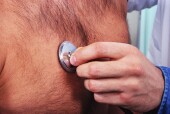Triglycerides Linked to Coronary Disease Risk
Should be considered along with LDL cholesterol in prevention efforts, study indicates.
By Ed Edelson
HealthDay Reporter
|
E-mail this article
Subscribe to news
Printer friendly version
|

(SOURCES: Michael Miller, M.D., director, preventive cardiology, University of Maryland Medical Center, Baltimore; Leslie Cho, M.D., interventional cardiologist, and director, Women's Cardiovascular Center, Cleveland Clinic; Feb. 12, 2008, Journal of the American College of Cardiology)
TUESDAY, Feb. 12 (HealthDay News) -- A new study showing that high levels of triglycerides were strong predictors of cardiac trouble strengthens the case for including measurement of the blood fats in prevention programs.
"Triglycerides traditionally have been viewed as second-class citizens," said Dr. Michael Miller, director of preventive cardiology at the University of Maryland Medical Center and lead author of the report in the Feb. 12 issue of the Journal of the American College of Cardiology.. "LDL cholesterol has always taken center stage. We know that LDL is intimately involved in bringing cholesterol to scavenger cells, which deposit them to form plaques in the arteries. This study shows that triglycerides in and of themselves are also lipids to blame."
The original study was designed to test the effectiveness of two LDL-lowering statins, Pravachol and Lipitor, in reducing recurring coronary disease after a heart attack. The new study went over the data on the 4,162 participants in the trial, looking at the association between triglyceride levels and the incidence of heart problems and death.
"The patients who had heart attacks came back after 30 days," said Miller. "We measured LDL levels and triglyceride levels and followed them over the next two years, evaluating for the occurrence of new events and death. If a patient had triglyceride levels below 150 [milligrams per deciliter], there was a 27 percent lower risk of having a new event over time. After multiple adjustments, for such things as age, diabetes, high blood pressure and obesity, the risk reduction was 20 percent."
Unlike LDL cholesterol, for which there is a recommended blood level, 70 or below, there is no recommended blood triglyceride level, Miller said, but 150 milligrams per deciliter or below is "considered as desirable."
When the participants were divided into four groups on the basis of both LDL and triglyceride levels, those in the group with under 150 for triglycerides and under 70 for LDL did the best, with a 28 percent lower risk than those in the group with the highest readings for both LDL and triglycerides, he said.
The results obviously need verification, Miller said. "At the present time, we don't have a recommendation for triglyceride lowering, so the next logical step is a study to determine whether lowering triglycerides and LDL reduces risk more than lowering LDL alone," he said. Two such studies are in progress, Miller noted.
Previous research has already pointed toward such a connection: A study that appeared in Neurology last December found a link between triglycerides and stroke risk, while research published in the Journal of the American Medical Association last July showed that when high triglyceride levels showed up in nonfasting cholesterol tests, there was an increased risk for a future heart attack.
Dr. Leslie Cho, an interventional cardiologist who is director of the Women's Cardiovascular Center of the Cleveland Clinic, noted that the new report "is not a huge surprise."
"The unique thing about this study is that even if you control bad LDL cholesterol to less than 70, you still need to look at triglycerides," Cho said.
The problem with triglycerides is that "they are the most unstable fats in the body," so that at least two readings are needed to get an accurate measure of blood levels, she explained.
Meanwhile, Miller said, "I am proactive about both LDL cholesterol and triglycerides." Several measures can be taken to lower triglyceride levels -- many of them already recommended on general principles for reduction of coronary risk.
One is to eat a Mediterranean diet, rich in fish. Omega-3 fatty acids can lower triglyceride levels, as can niacin, and exercise has a beneficial effect, Miller said. Statins also have some triglyceride-lowering effect, he noted.
"If you can effectively get both LDL cholesterol and triglycerides down, you are going to do better," Miller said.
More information
You can learn what triglycerides are and why they matter from the American Heart Association. 
Copyright © 2008 ScoutNews, LLC. All rights reserved. 
HealthDayNews articles are derived from various sources and do not reflect federal policy. healthfinder.gov does not endorse opinions, products, or services that may appear in news stories. For more information on health topics in the news, visit the healthfinder.gov health library.